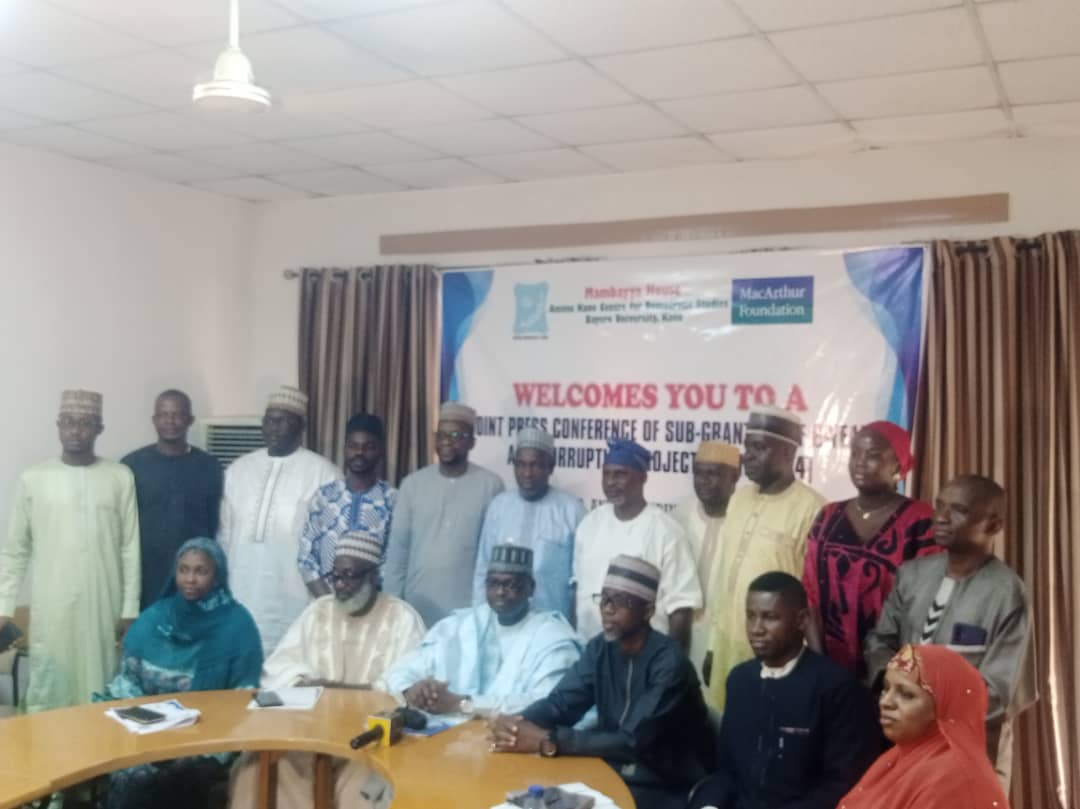By Mustapha Salisu
The Aminu Kano Centre for Democratic Studies, Mambayya House, at Bayero University, Kano, has pledged to remain a relentless force against corruption in Nigeria, regardless of funding limitations.
This commitment was emphasized by the center’s director, Professor Habu Mohammed, during a press conference held in Kano on Monday. The conference marked the successful conclusion of Mambayya House’s six-year anti-corruption projects, spanning 2018 to 2024.
Professor Mohammed acknowledged the valuable role of grants, like those provided by the John D. and Catherine T. MacArthur Foundation, in supporting their anti-corruption efforts over the years. However, he emphasized that the project’s conclusion does not signal an end to their fight.
“We are incredibly grateful for the funding that has empowered our initiatives. However, our dedication to dismantling corruption remains steadfast. We will leverage our existing resources to continue this vital mission” Professor Mohammed stated.
PRIME TIME NEWS reports, the press conference serves as a platform to showcase the project’s impressive outcomes. It highlighted the relentless efforts, collaborative partnerships, and impactful initiatives undertaken to combat corruption and promote transparency in Nigeria.
The Director revealed over the past six years, Mambayya House has achieved significant milestones. “More than 500 religious and community leaders, alongside over 200 organizations, received training in fostering internal accountability and transparency. This training has demonstrably improved financial practices, with over 70% of these organizations implementing regular bookkeeping and financial discipline measures”
“Furthermore, the project facilitated the establishment of 31 functional anti-corruption networks across various geopolitical zones, encompassing over 150 local organizations. These networks have spearheaded numerous anti-corruption activities, reaching hundreds of communities and benefiting over 800 individuals” Prof. Muhammad revealed.
He added that, a noteworthy aspect of the project was the creation of 32 student-run anti-corruption clubs in secondary schools across northern Nigeria, with additional clubs established in tertiary institutions. Young anti-corruption advocates, particularly female students, were trained to lead these clubs, fostering integrity at the grassroots level.
According to him, extensive media campaigns, including radio jingles, talk shows, and social media advocacy, played a crucial role in raising public awareness. “These campaigns reached millions of Nigerians, contributing to a more informed and engaged citizenry”
“Mambayya House also employed innovative approaches to engage youth, utilizing popular culture elements like sports, music, dance, and drama. Additionally, the project demonstrated a strong commitment to gender equality and social inclusion, with participating organizations integrating these principles into their operations” The Director added.
He further elucidated that Mambayya House actively fostered collaboration between local actors engaged in anti-corruption efforts, anti-corruption agencies, and international bodies like the U.S. Consulate. These partnerships significantly enhanced the project’s impact and recognition.
“Community-led anti-corruption projects were launched in various states, focusing on budget tracking, project monitoring, and advocacy. These efforts increased transparency in local governance and fostered a culture of accountability” He added.
PRIME TIME NEWS reports as the project officially concludes on June 30, 2024, the Aminu Kano Centre for Democratic Studies remains resolute in its mission. Mambayya House pledges its continuous support for ongoing efforts to combat corruption and promote good governance in Nigeria.
Professor Mohammed concluded the conference by expressing his optimism about the project’s long-term impact and the continued collaboration among stakeholders towards building a more transparent and accountable society.


